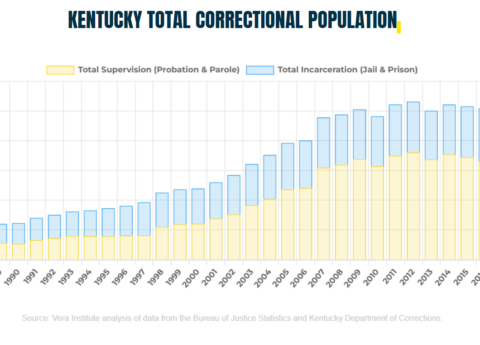Since initial 2011 reforms, the KY General Assembly has passed only 10 laws that further reduce incarceration — and 59 laws that increase punishment
Kentucky received national attention in 2011 for a significant criminal justice reform package, but a decade later the state’s mass incarceration problem is now worse. A new report from the Kentucky Center for Economic Policy identifies a key cause: since enacting that initial law, the General Assembly has passed 59 bills that increased or enhanced criminal punishment, while passing only 10 bills that reduced criminalization and incarceration.
As a result, the number of people incarcerated has been rising, and if Kentucky were a country, it would rank seventh-highest in the world for its rate of incarceration, worse than all countries outside of the United States, and all but six other states.
Since 2011, as the report details, the state has made substantial moves toward more incarceration and increasing criminal penalties, particularly for drug-related felony offenses despite ample evidence that such punitive measures don’t actually work to fix the social problems associated with substance use. This disturbing trend disproportionately impacts communities of color, low-income communities, people with disabilities and other heavily policed groups, entrenching disparities in the criminal legal system and in economic well-being, and creating a barrier to achieving health equity.
When there’s a 6:1 advantage in Kentucky legislation that increases criminal penalties rather than reducing them, the outcomes are clear: more incarceration, more families devastated, more harm than good in communities, and public resources going to locking people up instead of interventions that work.
“Today, there are over 30,000 people incarcerated in Kentucky’s jails and state prisons, and that number has been growing every year except for a slight, temporary reduction related to COVID-19,” said Carmen Mitchell, policy analyst with the Kentucky Center for Economic Policy. “The number of people incarcerated in Kentucky will continue to grow unless there is a significant policy shift away from increased criminalization and punishment, and toward making community investments that provide the support and resources people need to thrive.”
Enhancing criminalization is bad for all Kentuckians, but especially Black Kentuckians, who are disproportionately represented among incarcerated people. These disparities are a legacy of policies and practices within the criminal legal system that make it more likely for Black Americans to be searched, arrested, detained pretrial, charged under habitual offender laws, convicted and sentenced to harsher terms, all of which begin with the General Assembly’s legislation.
Written by Mitchell and other KyPolicy analysts, the new report examines what has happened over the past 10 years in Kentucky leading to more rather than less incarceration. It begins with a look at incarceration trends over the last decade and then explores the General Assembly’s policy choices driving those trends with a primary focus on laws that enhanced criminalization. The report details the opportunities lost when the legislature enacts new criminal bills in an attempt to solve a problem — whether it’s substance use, violence, or something else — instead of working on legislation and investments that would address the problems through alternative solutions and budgetary investments in strengthening communities. The report concludes with a review of the strong consensus in research that high rates of incarceration don’t actually make communities safer, and that alternatives to incarceration are much more effective.
“Though the vast majority of policies passed in the last decade thwart progress on incarceration, modest but important policy advances in the 2020 and 2021 legislative sessions — through opportunities to earn time off probation and an increase in the felony theft threshold — are steps in the right direction that the legislature must build on going forward,” said Mitchell.
The report’s recommended next steps for legislation include rolling back harshly punitive laws like drug criminalization laws — starting with reclassifying drug possession from a felony to a misdemeanor — and other laws like the state’s Persistent Felony Offender law that is one of the broadest and most severe mandatory minimum laws in the country.
The report also calls on the legislature to focus on evidence-backed strategies to reduce violence in Kentucky’s communities: improving access to early childhood education, investing in familial supports, enhancing the physical environment, engaging youth and supporting their skill development, reducing substance use and mitigating financial stress.
Click here to read the full report.

